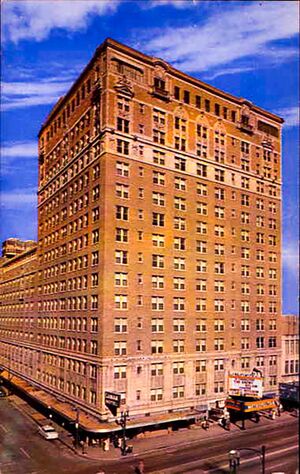Suite 8F Group
(Deep state faction) | |
|---|---|
 LBJ had a room at the Lamar Hotel, and its Suite 8-F was famous in political history as a Texas version of a "smoke-filled room" | |
| Formation | 1930 |
| Extinction | 1968 |
| Headquarters | Suite 8F, Lamar Hotel, Houston, Texas |
| Membership | • George R. Brown • Herman Brown • Jesse H. Jones • James A. Elkins • Gus Wortham • Lyndon B. Johnson • Sam Rayburn • John Connally • Walter Mischer • James Abercrombie • Hugh Roy Cullen • William Hobby • William Vinson • Morgan J. Davis • Albert Thomas • Alvin Wirtz • Thomas Corcoran • Homer Thornberry • Edward Clark |
| A network of politically active businessman in Texas from the 1930s into the 1960s | |
The Suite 8F Group (named after their regular meeting place, rented long term by Brown & Root) was network of politically active businessman in Texas from the 1930s into the 1960s.[1] The name comes from the room in the Lamar Hotel in Houston, Texas where they held their meetings.[1] The room was reported to have been permanently rented to and paid by Brown and Root.[1] The group had its heyday when their man Lyndon B. Johnson became president.
According to Texas Monthly, the 8F Crowd had gained "unequaled influence in state and national government" after the end World War II when George R. Brown, Gus Wortham, and Charles Francis of Vinson & Elkins founded Texas Eastern.[1] The group was reported to exercise leverage over Big Oil.[1] The 8F Crowd had connections to various media outlets including the Houston Chronicle, the Houston Post, television station KPRC, and radio stations KPRC and KTRK-TV#History.[1]
Suite 8F helped to coordinate the political activities of other right-wing politicians and businessmen based in the South. This included Robert Anderson (president of the Texas Mid-Continent Oil and Gas Association, Secretary of the Navy and Secretary of the Treasury), Robert Kerr (Kerr-McGee Oil Industries), Billie Sol Estes (entrepreneur in the cotton industry), Glenn McCarthy (McCarthy Oil and Gas Company), Earl E. T. Smith (U.S. Sugar Corporation), Fred Korth (Continental National Bank and Navy Secretary), Ross Sterling (Humble Oil), Sid Richardson (Texas oil millionaire), Clint Murchison (Delhi Oil), Haroldson L. Hunt (Placid Oil), Eugene B. Germany (Mustang Oil Company), David Harold Byrd (Byrd Oil Corporation), Lawrence D. Bell (Bell Helicopters), William Pawley (business interests in Cuba), Gordon McLendon (KLIF), George Smathers (Finance Committee and businessman), Richard Russell (chairman of the Committee of Manufactures, Committee on Armed Forces and Committee of Appropriations), James Eastland (chairman Judiciary Committee), Benjamin Everett Jordan (chairman of the Senate Rules Committee), Fred Black (political lobbyist and Serve-U Corporation) and Bobby Baker (political lobbyist and Serve-U Corporation).[2]
Purpose
One of the main concerns of this group was to protect the interests of the Texas oil industry. The most prolific in oil reserves in the United States that was not discovered until October 1930. The discovery of oil in Texas caused a small group of men to own a great deal of money. They decided to join in in order to keep their earnings. This includes strategies to keep the price of oil as high as possible.
Texas oil millionaires also fought hard to maintain their tax benefits. The most important of these was the oil depletion allocation. It was first introduced in 1913 and allowed producers to use the allowable depletion to deduct only 5 percent of their income and the deduction was limited to the original cost of their goods.
Dwight D. Eisenhower's decision to cancel this tax loophole angered the oil industry. Sid Richardson and Clint Murchison began negotiations with Eisenhower. In June 1957, Eisenhower agreed to appoint their man, Robert Anderson, as Secretary of the Treasury.
According to Robert Sherrill in his book The Accidental President: "A few weeks later Anderson was appointed to a cabinet committee to "study" the oil import situation; out of this study came the present-day program which benefits the major oil companies, the international oil giants primarily, by about one billion dollars a year.
On the advice of Texan Lyndon B. Johnson, Kennedy appointed John Connally as Secretary of the Navy. This is an important position, as it controls a large amount of federal spending, including the contract for the supply of oil to the United States Navy. When Connally became Governor of Texas, Johnson organized his friend from Texas, Fred Korth, to become the new Secretary of the Navy.
However, two years later, Kennedy decided to take on the oil industry. On October 16, 1962, Kennedy was able to persuade Congress to pass a law that eliminated the distinction between repatriated profits and profits reinvested abroad. While this law applies to the industry as a whole, it mainly affected oil companies. It is estimated that as a result of this legislation, rich oilmen saw their earnings on foreign investment drop from 30 percent to 15 percent.
On January 17, 1963, President Kennedy presented his proposals for tax reform, where he claimed that he wanted to eliminate special privileges and loopholes. The President even said he wanted to do away with the oil depletion allowance. It is estimated that the proposed removal of the oil depletion allowance would result in a loss of about $ 300 million a year for the Texans.
In November 1963, Fred Korth was forced to resign as a result of corruption allegations following the award of a $7 million contract for a combat aircraft, the General Dynamics TFX, a Texas-based company. Johnson